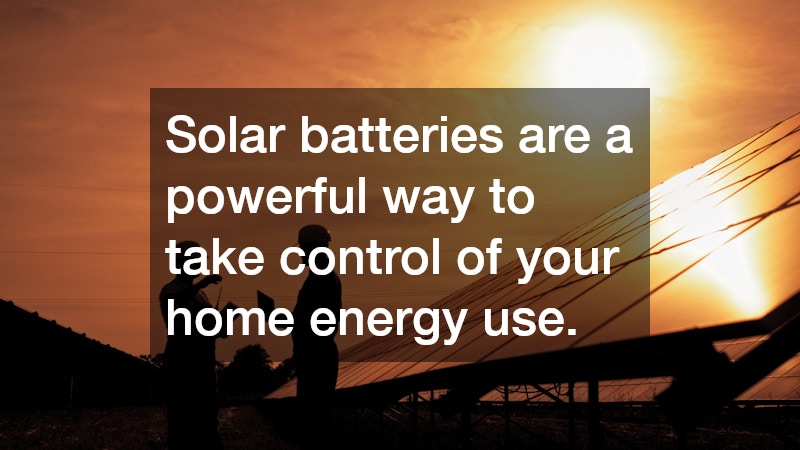The Complete Guide to Choosing Solar Batteries for Your Home
Installing solar panels is a smart step toward energy efficiency, but adding solar batteries can take your system to the next level. These batteries allow you to store excess energy generated during the day so you can use it at night or during power outages. With energy prices on the rise, many Australian homeowners are looking to solar batteries to reduce costs and increase independence from the grid.
When paired with a well-designed solar setup, batteries can maximise your home’s renewable energy usage. Rather than sending unused solar energy back to the grid, you can store it and use it when your panels aren’t producing power. This means lower bills, fewer disruptions and more control over your electricity supply.
Know Your Energy Needs Before Choosing
Every home is different, so understanding your household’s power usage is essential before investing in solar storage. If you run multiple appliances, have a large family or frequently use power after sunset, your energy needs will be higher than a home with minimal demand. Reviewing your electricity bills and usage patterns is a good starting point.
Once you’ve got a sense of your daily energy needs, you can determine how much battery capacity is right for you. Battery size is measured in kilowatt-hours (kWh). Most average Australian homes benefit from systems that range between 5 and 15 kWh. Oversizing can be costly while undersizing means you’ll still rely heavily on the grid.
Understand Battery Types and Lifespan
The most common solar batteries in Australia are lithium-ion. These offer high efficiency, long lifespans and compact designs, making them ideal for residential use. They also provide a good depth of discharge, which is how much energy you can use before recharging. Most lithium batteries can safely discharge around 80 percent of their capacity.
Other options include lead-acid batteries, which are more affordable but bulkier and shorter-lived. While these may suit off-grid systems or very specific needs, most homeowners today choose lithium options for their reliability and performance.
Battery lifespan matters too. A quality solar battery can last anywhere from 5 to 15 years, depending on usage and maintenance. Check manufacturer warranties and cycle ratings — which indicate how many charge and discharge cycles the battery can complete — before committing.
Evaluate Efficiency and Backup Capability
Round-trip efficiency tells you how much energy you get out of a battery compared to what goes in. For example, if a battery has 90 percent efficiency, it loses only 10 percent of the energy during storage and release. The higher the efficiency, the better your long-term savings and system performance.
Some batteries come with integrated backup capability, meaning they’ll automatically power your home in a blackout. Others may require additional equipment. If reliable power during outages is a priority, make sure to check whether a backup option is included or can be added to your system.
Installation and Inverter Compatibility
Solar batteries must be compatible with your existing system. Some systems work better with hybrid inverters, which handle both solar panel and battery input. Others may need a separate battery inverter. It’s best to work with a licensed installer who can assess your setup and recommend the right configuration.
Location matters as well. Batteries should be installed in a well-ventilated, weather-protected area, either indoors or outside. Your installer should follow Australian safety standards and ensure the battery is secure, accessible and properly cooled.
Cost Versus Long-Term Value
The upfront cost of solar batteries can be significant, often ranging between $5,000 and $15,000 depending on size, brand and features. However, government rebates or feed-in tariffs may reduce your investment. Over time, solar storage can help offset rising electricity prices and reduce your payback period, especially when paired with time-of-use tariffs.
Beyond savings, having a solar battery also adds value to your home. Buyers increasingly look for energy-efficient features and lower running costs. A well-installed solar and battery system can make your property more appealing to environmentally conscious buyers.
Work With a Trusted Installer
Choosing the right installer is just as important as selecting the right battery. Look for Clean Energy Council-accredited professionals who have experience with battery systems. A good installer will assess your site, explain the best options and provide a detailed quote that includes equipment, installation and warranties.
Ask questions about post-installation support, monitoring options and whether the system can be expanded in the future. Quality installers will be transparent and focused on your long-term satisfaction rather than quick sales.
Solar batteries are a powerful way to take control of your home energy use. Whether your goal is to save on bills, prepare for blackouts or lower your environmental impact, the right system can deliver lasting value. With careful planning and professional advice, you can choose a battery setup that fits your lifestyle and enhances your solar investment.
By understanding your energy needs, knowing what features to look for and working with a trusted installer, you’ll be well on your way to smarter energy use at home.
